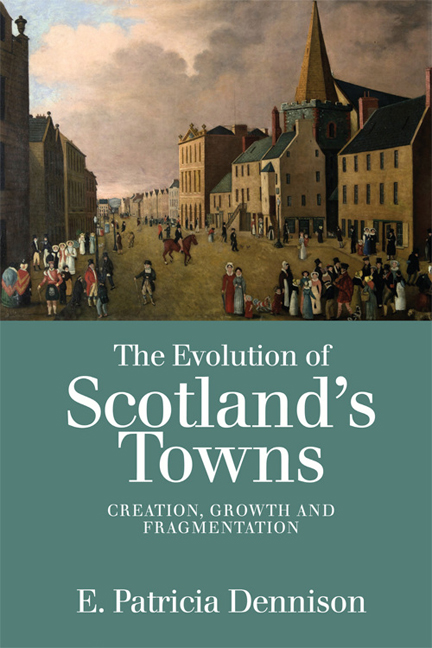Book contents
- Frontmatter
- Contents
- List of Figures
- Acknowledgements
- Image Credits
- List of Abbreviations
- Introduction
- 1 Medieval Towns
- 2 Daily Life in the Middle Ages
- 3 Medieval Faith and the Church
- 4 Encroachment on Burgh Society, 1550–1750
- 5 Man-made and Natural Disasters, 1550–1750
- 6 The Birth of Urban Scotland
- 7 The Victorian Town
- 8 The Twentieth Century
- Post-script: Footprints to Fragmentation
- Appendix: Population Statistics – A Select List
- Bibliography
- Index
5 - Man-made and Natural Disasters, 1550–1750
Published online by Cambridge University Press: 11 November 2020
- Frontmatter
- Contents
- List of Figures
- Acknowledgements
- Image Credits
- List of Abbreviations
- Introduction
- 1 Medieval Towns
- 2 Daily Life in the Middle Ages
- 3 Medieval Faith and the Church
- 4 Encroachment on Burgh Society, 1550–1750
- 5 Man-made and Natural Disasters, 1550–1750
- 6 The Birth of Urban Scotland
- 7 The Victorian Town
- 8 The Twentieth Century
- Post-script: Footprints to Fragmentation
- Appendix: Population Statistics – A Select List
- Bibliography
- Index
Summary
The years from 1550 to 1750 were years of profound change. Towns were hit hard by both warfare and natural disasters. There were three reasons why they took the brunt of war. In the first instance, they were a taxable commodity, already paying a hugely disproportionate percentage of national taxation, a sixth, and in wartime, they were the readiest source of funds. Second, towns could provide manpower for the battlefield, most burgesses already having a rudimentary military training through regular wappinschaws (see p. 68). And third, towns could be forced to offer both quarter and supplies for troops – essential commodities in a prolonged but shifting war zone. While coping with the man-made disasters of war and occupation, towns had also to face a series of natural disasters which made life harsh in the good times but almost insuperable in the bad.
War and occupation in the seventeenth century
Taxation rose considerably from the 1620s and was throughout Scotland one of the main objections to royal policy. The underlying economic and financial disaffection was brought to a head by what were perceived to be the alarming religious and political manoeuvrings of Charles I (1625–49). The crown's attempts to reintroduce a form of Episcopalian worship brought a lively response from the burghs. The first body to approve the National Covenant, opposing the king's religious innovations, was the Convention of Royal Burghs at Stirling in August 1638. The consensus went further, decreeing that no one should be entered as a burgess or be a representative as a burgh commissioner to the Convention unless he subscribed the Covenant.
Some burghs had already shown their disapproval of crown policy. Maybole parishioners as early as September 1637 set up a petition of objection to the purchase and use of the new prayer book imposed by the crown. Not all burghs, however, were so quick to express their grievances. Many initially played a waiting game to see how Edinburgh would react, although a few – Glasgow, Stirling, Ayr, Dumbarton, Irvine and Cupar – declared on their own initiative. Once Edinburgh defected from the crown, the floodgates opened and most burghs subscribed the Covenant.
- Type
- Chapter
- Information
- The Evolution of Scotland's TownsCreation, Growth and Fragmentation, pp. 138 - 169Publisher: Edinburgh University PressPrint publication year: 2017



